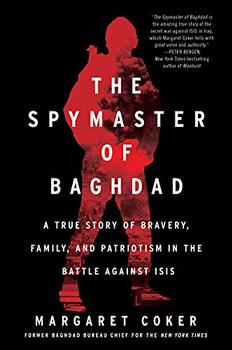Summary | Excerpt | Reading Guide | Reviews | Beyond the Book | Readalikes | Genres & Themes | Author Bio

A True Story of Bravery, Family, and Patriotism in the Battle against ISIS
by Margaret Coker
These are the blessings of the oldest child, Harith would always tell himself. Such as my blessings are.
To his wife, who blanched at her husband's treatment of their firstborn son, Abu Harith would say the beatings were for his own good. When the boy scored the highest marks in the entire district on the nationwide exam given to all high school seniors, a score that guaranteed him a seat at Baghdad's best university, Abu Harith felt vindicated. He walked around the neighborhood bragging that his son, the first member of the al-Sudani clan to reach college, would get a job in a well-regarded profession—like engineering.
As much as anyone in Iraq, Abu Harith knew that life didn't turn out exactly how one hoped for or planned.
In the mid-1970s, as the global oil boom turned Iraq into an international economic powerhouse, Abu Harith had dreamed of making a good life for himself and his young bride. The couple traveled from their agricultural village on the lower Tigris River one hundred miles north to Baghdad, drawn to the promise of the booming capital. Like several hundred thousand villagers, Abu Harith got off the train and found a cozy adobe home for rent in the budding new district on the eastern edge of the capital known then as Al Thawra, or Revolution City. The gleaming new streets and buildings were heralded as a step toward building a modern Iraq. But within a decade, Iraqis found themselves choking under the yoke of a new dictator, Saddam Hussein, and bleeding from a brutal war with Iran. The residents of Al Thawra, meanwhile, found themselves trapped in the undertow of Hussein's politics. The residents of the district were all Shiite, the branch of Islam practiced by a majority of the country but not their ruler. Saddam deemed his Shiite citizens potential fifth columnists, due to their shared religious identity with Iraq's mortal enemy, Iran.
Instead of becoming the vanguard of a new nation, Al Thawra residents were physically cut off from the rest of Baghdad by a fifty-foot-wide canal, a manifestation of the barrier that already existed between the lower-class Shiites new to the capital and the urbane families who had been in Baghdad for generations.
Families like the al-Sudanis could do nothing to reverse the slide of their political or social fortunes, except try to avoid politics and keep their heads down.
Stuck in a ghetto that their new ruler had renamed Saddam City, they had neither the political connections nor the family wealth to move to another neighborhood. When a wealthy man from Jadriya, Baghdad's upper-class neighborhood, built himself a mansion along the banks of the Tigris River, his architect hired bricklayers from the denizens of Saddam City. When police looked for suspects in a robbery, they combed the streets of Saddam City. The only times when the government ignored the district was when the authorities were looking to recruit military officers, civil servants, or engineers. There was no quicker way to be disqualified for a job than the line on a man's identification card showing that his permanent residence was in Saddam City.
So it was that Harith and his brothers grew up without many heroes or inspirations for greatness. The country had only one Olympic medalist, and that was a 1960 weight lifter. The national soccer team had qualified for the World Cup once, but was knocked out in the first round. There was the singer Kathem al-Saher, who was the pride of Iraq, beloved by the dictator and the country alike. More often, however, the nation's one television station filled the airwaves with lurid tales of traitors and more traitors.
Like most of the other boys in their neighborhood, Harith went through his early life wary of what the future had in store. Each day along his route to school, he zigzagged through a web of alleyways, past his uncle's home, and across the empty hard-packed dirt lot where the neighborhood boys would play soccer, to pick up his two best friends, Ali and Wissam, so the threesome could walk to school together. Turning westward from Ali's home, the boys had to pass an abandoned two-story house that they, and everyone else in the neighborhood, were certain was haunted.
Excerpted from The Spymaster of Baghdad by Margaret Coker. Copyright © 2021 by Margaret Coker. Excerpted by permission of Dey Street Books. All rights reserved. No part of this excerpt may be reproduced or reprinted without permission in writing from the publisher.
Your guide toexceptional books
BookBrowse seeks out and recommends the best in contemporary fiction and nonfiction—books that not only engage and entertain but also deepen our understanding of ourselves and the world around us.